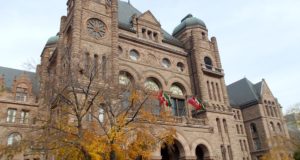Can a matter of church discipline be appealed from a church to a court? The question has made its way up to the Supreme Court of Canada in Wall v Judicial Committee of the Highwood Congregation of Jehovah’s Witnesses. It may surprise you that it was answered in the affirmative by the chambers judge, Justice Wilson, and by a majority at the Alberta Court of Appeal. The SCC will hear the appeal later this year.
Back up against a Wall
“Church discipline” is shorthand for the practice of censuring a member of a religious community for wrong behaviour, particularly when the member is unrepentant. In Christian circles, the severest or final form of discipline is excommunication. If a person is excommunicated, it typically means that they may not participate in the Lord’s Supper or mass. It may also mean they are not permitted to participate in the governance or ministries and certain activities of the church.
Jehovah’s Witnesses practice a form of excommunication called “disfellowshipping”, which involves “shunning” by the congregation. Jehovah’s Witnesses are not to speak to or associate with disfellowshipped members.
Randy Wall, the applicant in Wall, was disfellowshipped from the Highwood Congregation for being, in their view, insufficiently repentant for two instances of drunkenness. Wall was a real estate agent. Around half of his clients were Witnesses, but after Wall was disfellowshipped they refused to do business with him. Wall applied for judicial review of the Congregation’s decision to disfellowship him – judicial review, not an action for damages.
The preliminary question of the court’s jurisdiction was raised. Justice Wilson decided that the court had jurisdiction for two reasons. First, the Congregation’s decision had an economic impact on Mr. Wall. Second, Wall alleged that the Congregation’s procedure for disfellowshipping him did not satisfy the requirements of natural justice. In other words, if a party does something affecting your pocket book and you allege that it was unfair, a judge can review it.
The majority at the Alberta Court of Appeal, in 29 short paragraphs, agreed that the courts have jurisdiction. Since judicial review is a discretionary remedy, the majority says, the standard of review is “one of deference unless the conclusion is unreasonable” – i.e. reasonableness. Given the seriousness of what is at stake for Mr. Wall, the ABCA majority concluded that Justice Wilson’s finding on jurisdiction was reasonable and returned the matter to the Court of Queen’s Bench for a hearing on the merits. The Highwood Congregation, however, appealed to the SCC.
No room for error
This is all quite confused. There are no facts in question here; it is a purely legal issue. Do the courts have jurisdiction to review the decision of an unincorporated religious body? The ABCA majority’s answer is essentially, “It seems reasonable, given Mr. Wall’s difficult circumstances, for Justice Wilson to find that the court has jurisdiction to review the Congregation’s decision.”
But the question the Court of Appeal must answer is whether Justice Wilson was correct. As the Supreme Court of Canada stated in Housen, the standard of review applicable to questions of law that arise on appeal is correctness. The primary role of appellate courts is to delineate legal rules and ensure their proper and consistent application.
The ABCA majority seems to think that Mr. Wall’s difficult personal situation gives the court jurisdiction. There is no tort, breach of contract, or other cause of action here. This is about jurisdiction to judicially review a matter of church discipline – or a collective decision by a religious group to socially shun someone, if you prefer. Tied up in the question of jurisdiction in this case are questions about freedom of religion and association. The case, then, is about the state’s authority to decide religious questions, to override a religious association’s freedom to decide internal matters – the kind of thing wars have been fought over.
These are the kinds of fundamentally important legal questions that demand clarity from appellate courts. In my view, the ABCA majority fell far short.
Exhausting church process
In support of their ruling, the ABCA majority quotes Hart v Roman Catholic Episcopal Corporation of the Diocese of Kingston (2011 ONCA 728): “The courts will interfere in the internal affairs of a self-governing organization in only two situations: where the organization’s internal processes are unfair or do not meet the requirements of natural justice; or where the aggrieved party has exhausted the organization’s internal processes.”
In Hart, Mr. Hart’s employment with the Roman Catholic Episcopal Corporation of the Diocese of Kingston was in issue. Hart argued that while his relationship with the church was ecclesiastical in some respects, it also concerned property and civil rights. After all, Hart contributed to employment insurance and the Canada Pension Plan and paid income tax. He lost his pay and the lodging that accompanied his position when he was fired. However, Hart had not followed the Catholic Church’s internal review process, which he was bound by his employment agreement to do. Since Hart had not followed the required process, the ONCA found that it lacked jurisdiction.
In Wall, conversely, Mr. Wall had exhausted the Jehovah’s Witnesses’ internal processes. The ABCA majority therefore concluded that, unlike in Hart, the courts had jurisdiction here: “We note as well that the respondent appears to have exhausted all avenues of appeal within the church so jurisdiction could also be found on that basis.” So the majority relies on both the allegation of unfairness and the fact that Wall exhausted the Congregation’s appeal process as the basis for its decision.
Where’s the beef?
The ABCA puts the cart before the horse. A person has no free-standing legal right to fair procedure from a private association, nor any right to appeal the decision of such an association to a court simply because he has exhausted the association’s internal processes. Rather, there must be some legal right or interest at stake in the first place, as in Hart. Or there must be some other legal basis for the procedural duties alleged, such as the requirement that a corporation, including a charity, comply with bylaws that are adopted pursuant to legislation.
In Hart, the Ontario Court of Appeal noted that while the courts generally have jurisdiction to adjudicate claims of wrongful dismissal and breach of an employment contract, there are two exceptions. The first relates to interpreting collective agreements, where disputes must be resolved by arbitration. The second “is where the rules of a self-governing organization, especially a religious organization, provide an internal dispute resolution process.”
Hart was legally bound to follow the Catholic Church’s processes, which he had not done. Only after he had honoured those processes could he seek judicial review. But he was entitled to the internal process only because it was part of the employment relationship. This is the context for the ONCA saying that “only where the organization’s internal processes are unfair or do not meet the requirements of natural justice; or where the aggrieved party has exhausted the organization’s internal processes” does the court have jurisdiction – where the applicant is claiming a breach of their civil rights and the necessary internal processes have failed him.
Wall, conversely, had no contract that the Congregation had breached, no property that had been forfeited, nor any other civil claim. What we’re left with is a court asserting itself as essentially a higher religious authority, what you might think of as a bishop, council, or synod in other denominations – a religious official or religious body with authority over local congregations.
Know your limits
Can a court ever have jurisdiction if no civil right is at stake? Yes, says the ABCA majority, citing Lutz v Faith Lutheran Church of Kelowna (2009 BCSC 59) as “an example of a court reviewing a religious organization’s decision to expel a congregant on the basis that there had been a breach of the rules of natural justice”, despite that fact that no civil or property right was engaged. That is true, so far as it goes. But the allegation in Lutz was that the church had not complied with its bylaws, which were adopted pursuant to the Society Act. The Church was a registered society under the Act and the court reviewed the Church’s decision for compliance with its bylaws. And the court was able to do so in that case without getting into moral or doctrinal disputes.
Now, the judge in Lutz also said that he could go beyond examining the church’s bylaws to further require that the Church meet a certain standard of neutrality. Going beyond the Church’s bylaws was unnecessary, in my view, since those bylaws required a hearing and a judge can properly inquire into whether the bylaws explicitly or implicitly require a hearing by a neutral party.
Going beyond the church’s bylaws was not only unnecessary, but wrong in principle. Consequently, it only takes Justice Meiklem in Lutz a couple of sentences to go from finding a duty of neutrality independent of the bylaws to finding that “where we are dealing with membership in a church congregation rather than a social club”, a stricter standard of neutrality is required of decision makers in a church as compared to a social club because “exclusion from membership in a church congregation is more significant than exclusion from a social club”. How does Justice Meiklem know that exclusion from a church is more significant? Because, “One petitioner describes the underlying issue of the church’s position on same sex unions, which drove the conduct of the petitioners, as ‘serious business it involves our souls’.” Just like that, a judge gets embroiled in religious matters. Even if Justice Meiklem avoids weighing in on the moral or doctrinal issue directly, he is judging how important that issue is and determining the content of the duty of procedural fairness owed by the church based on that judgement.
Contrast Lutz and the ABCA majority’s reasoning in Wall with the American Ninth Circuit Court of Appeal ruling in Paul v Watchtower Bible and Tract Society of New York (56 USLW 2007): “Shunning is a practice engaged in by Jehovah’s Witnesses pursuant to their interpretation of canonical text and we are not free to reinterpret that text.” Although a disfellowshipped person’s life may be greatly impacted, the Court found “the practice of shunning not to constitute a sufficient threat to the peace, safety, or morality of the community as to warrant state intervention.” Unlike the ABCA majority in Wall, the Court in Paul also takes religious freedom into account, stating that “permitting [the plaintiff] to recover for intangible or emotional injuries would unconstitutionally restrict the Jehovah’s Witnesses free exercise of religion.”
A thoughtful dissent
Justice Wakeling, in dissent at the ABCA, explains clearly that one cannot claim an entitlement to natural justice against a private association that has no statutory authority whatsoever. His detailed, well reasoned, and carefully footnoted opinion stands in sharp contrast to the slapdash, five-page decision of the majority. Justice Wakeling treats the matter with the seriousness it deserves. I am confident that the Supreme Court of Canada will do the same. And I believe that Justice Wakeling’s position will prevail at the Supreme Court.
The Highwood Congregation is not a public actor that can be subject to judicial review for purposes of procedural fairness, Justice Wakeling says. “No case of which I am aware has ever provided a satisfactory explanation as to why a group like the Highwood Congregation that makes decisions that have no impact on those outside the group is subject to judicial review.”
Moreover, Wakeling says, Mr. Wall’s freedom of association does not compel other Jehovah’s Witnesses to associate with him, as Justice Wilson at the Court of Queen’s Bench thought (getting freedom of association exactly wrong). Justice Wakeling also emphasises that, although Mr. Wall’s disfellowshipping may impact his business, no property interest or contractual right has been violated and Mr. wall has no right to the Jehovah Witnesses’ business. He cannot use section 2(d) of the Charter to claim a right to associate with this Congregation.
“Fundamental constitutional principles give the members of the Highwood Congregation the right to determine their coreligionists,” Justice Wakeling writes. He compares the Highwood Congregation to a bridge club. The club’s decision about who gets to be part of the club are not reviewable. Yet Justice Wakeling also takes into account the fact that the Highwood Congregation is a religious association. He quotes Justice Gonthier’s comment in Hofer ([1992] S SCR 165) that “courts are slow to exercise jurisdiction over the question of membership in a voluntary association, especially a religious one.” The exception, as Justice Gonthier recognizes, is “when a property or civil right turns on the question of membership.”
That said, Justice Wakeling observes that “there is no definitive judgement from the Supreme Court of Canada opining on the constitutional status of religious associations’ membership decisions.” Perhaps that is not surprising, given that the courts do not have jurisdiction to review membership decisions, absent some civil right claim or alleged corporate bylaw violation.
Social justice sloppiness?
If Hart and Lutz are clearly distinguishable, as I believe they are, and no other precedent supports the ABCA majority ruling in Wall, then how do we explain the majority’s ruling? I believe the following three factors may help to explain the outcome. First, an ever-more-flexible approach to judicial review. Second, a low regard for precedent and a lack of appreciation for legal history generally. Third, a desire to keep the door open for judicial social justice heroism, should a member of a sympathetic minority suffer because of a religious body’s decision.
Recall that the ABCA majority begins its explanation for its decision to uphold the lower court ruling by saying that Justice Wilson’s (Court of Queen’s Bench) decision would be upheld if it was reasonable. Justice Wilson says, vaguely, “Part of what the church teaches has, I am satisfied […] established an economic threat here.” And he says, with no more clarity, that Mr. Wall “has suffered in a way that does involve the court’s jurisdiction.”
What way is that, exactly? Economically and emotionally, sure, but only as the result of people freely choosing to dissociate themselves with him. Wall does not have a right to the Jehovah Witness congregants’ business or friendship. So there is no clear legal interest that Justice Wilson can point to here. Yet he is satisfied that Wall’s suffering is such that it warrants judicial intervention. It is just such weak reasoning that one would expect to earn correction and perhaps admonition from an appellate court. But the Court of Appeal favours broad judicial jurisdiction.
Judges recognize that religious associations are an important part of people’s lives. Good. But because of that, some judges seem intent on arrogating power to protect people from perceived unfair treatment by such associations.
Wall illustrates the danger of interpreting the Charter of Rights and Freedoms in an hyper-individualistic manner, such that a person can use the Charter to harness the power of the state against a religious association, as Wall did at the Court of Queen’s Bench. It is a misreading of the Charter to say that an individual is entitled to participate in a religious community, institution, or school. Freedom of association is defeated if everyone is entitled to associate with a particular group and the group is not free to dissociate with anyone. In Wall, the state is not interfering with Wall’s freedom to associate, the association (the Congregation) is. The Charter does not protect you against a religious community, it protects you against the state.
Let it be
John Calvin, the famous Protestant Reformer, wrote nearly 500 years ago that “church discipline requires neither violence nor physical force, but is contented with the might of the word of God.” And the U.S. Court of Appeal recognized in Paul, it isn’t the courts’ job to say how the word of God should be interpreted and applied within a religious community.
The state has nothing to fear from religious communities expelling members for religious reasons. Mr. Wall may have a tough time building up a new real estate client base, but claiming judicial jurisdiction to review membership decisions of religious bodies wherever those decisions cause individual hardship is, in my estimation, a far greater threat to peace and freedom.
The point of judicial review is to protect individuals from state actors. Judicial review upholds the rule of law, restraining state power by requiring well defined laws and fair procedure as preconditions for its exercise. Mr. Wall’s personal issues with a religious community raise no rule of law interest. The courts have no jurisdiction here.
 Advocates for the Rule of Law
Advocates for the Rule of Law




One comment
Pingback: ARPA Canada at the Supreme Court: Wall - ARPA Canada